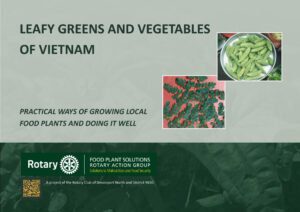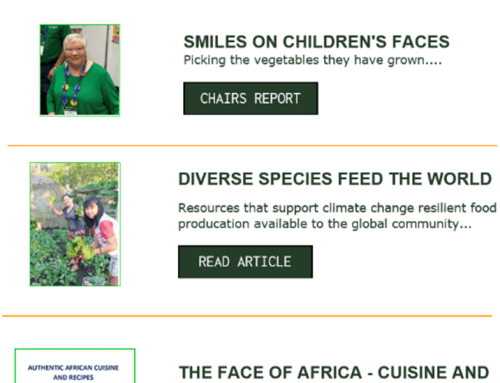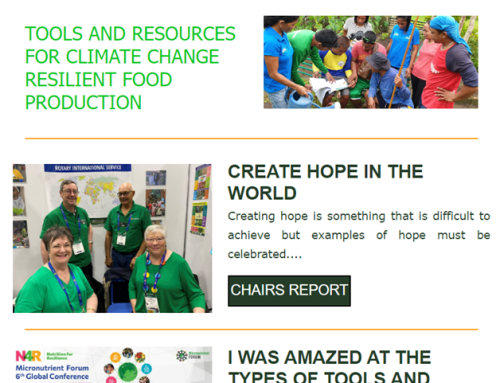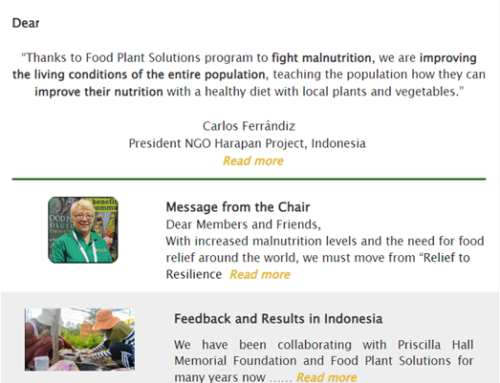Our July newsletter demonstrates how Food Plant Solutions is collaborating with key organisations (such as Pacific Farmers Organisation and FAO’s Family Farming Knowledge Platform) to make our educational materials more accessible to more people. We also look at a partnership in Brisbane, Queensland (Australia), that focuses on edible perennials. Collaboration and Partnerships – together we can achieve so much more.
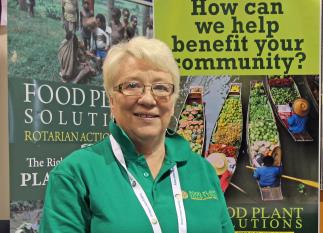
Message from the Chair
Welcome to a new Rotary year.
This is an exciting year, as we welcome the first female World President, Jennifer Jones, her theme is “Imagine Rotary”.
What a great theme, especially as we are all wondering what this year will hold for us. Change is very much on our minds as our club boards and Rotarians prepare their strategic plans. We are also reviewing our plans as we continue to grow.
So where are we going this year?
Firstly, we would like to develop Chapters of Food Plant Solutions Rotary Action Group in as many countries as possible, to help spread the message to more people. You may be able to ask people from clubs nearby to join you to form a Chapter. Please contact us for details info@foodplantsolutions.org
The second thing we are working on is to find a Major Sponsor. We are continually receiving requests which we cannot act upon quickly, as we need to first raise the funds. If you can recommend someone to us, we would be delighted to follow this up.
In this year when malnutrition is rising around the world, we know WE CAN MAKE A DIFFERENCE. We look forward to your continuing support.
Yours in Rotary,
PDG Una Hobday OAM, PHF
Chair – Food Plant Solutions Rotary Action Group
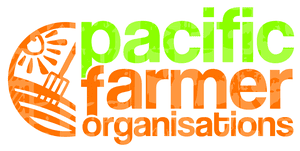
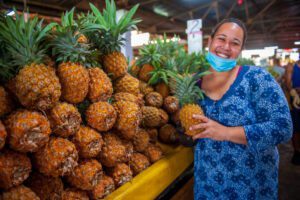
Pacific Farmers Call for Stronger Local Food Systems
– Illeyah Draunidalo, Communications Manager, Pacific Farmer Organisations
Access to healthy and nutritious food became an emerging concern as demand for educational content grew almost overnight and the impacts of the global pandemic took full effect in 2020.
Pacific Farmer Organisations Executive Director, Kyle Stice, says public awareness of traditional food crops is also becoming increasingly important in the Pacific region as the Network looks to empower farmers in their practices to conserve and sell traditional crops for nutrition, and climate change resilience as its campaign on Supporting Local Food Systems started welcoming a series of partnerships with experts from various sectors in the industry.
“When Covid first started in early 2020, there were huge disruptions in our food systems and the pressure to resolve the current supply and value chain of agriculture was high on the priority list of our members in 12 Pacific Island countries as work begun to coordinate recommendations to inform Governments and stakeholders on the construction of a supply chain.”
In Fiji alone more than 65,000 people viewed Fiji Television Limited’s Green Pillars on Facebook in 2020, a television program produced in response to the growing public interest in gardening and farming following the downturn caused by Covid-19 and was funded by the Pacific Farmer Organisations’ FO4ACP Program (Farmers’ Organizations for Africa, Caribbean and Pacific).
“People are now turning to agriculture to sustain themselves,” said Sitiveni Halofaki, the general manager of Fiji Television Limited. Not all of the viewers are properly educated on planting so what better way to learn than on television when people are glued to their screens during this time.”
Pacific Farmer Organisations is currently working with various partners including the Australian Centre for International Agricultural Research, Food Plant Solutions Rotary Action Group and Mrs Suliana Siwatibau in a call to support and strengthen local food systems in the Pacific.
Currently the Network is aiming to boost domestic food production in the wider Pacific region in response to climate change. As more farmers take more active measures to effectively adapt to current challenges and plans to increase capacity building in 2023 begin to take shape in key priority areas including, food security for at least 15 of its members in 9 Pacific Island countries.
FFKP – Family Farming Knowledge Platform
– Nathalie Santini, Family Farming Knowledge Platform Coordinator, Family Farming Engagement and Parliamentary Networks (PSUF), Partnerships and UN Collaboration Division (PSU), Food and Agriculture Organization of the United Nations – FAO
Launched in June 2015 by FAO, the Family Farming Knowledge Platform (FFKP) represents one of the main and long-lasting legacies of the 2014 International Year of Family Farming. The FFKP has been conceived for a wide range of users, from Government Officials to Farmers’ Organizations, from Academia to Civil Society Associations and Non-Governmental Organizations. The Platform is addressing needs of institutions, associations and individuals with an interest in family farming and related topics and is in a prime position to efficiently contribute to the United Nations Decade on Family Farming 2019-2028 (UNDFF).
FFKP gathers digitized quality information on family farming from all over the world, including national laws, public policies, best practices, research, articles, publications, agricultural training videos and much more. It provides a single access point for international, regional and national information related to family farming issues, integrating and systematizing existing information to better inform and provide knowledge-based assistance to policymakers, family farmers’ organizations, development experts, as well as to stakeholders in the field and at the grassroots level.
The FFKP is a participatory tool bringing together different entities – such as governments, academia, cooperatives, farmers’ organizations, civil society and international organizations – for sharing knowledge, solutions, and action-oriented initiatives around the world. It also represents an opportunity to showcase contributors’ updated content, events and initiatives led in an effort to raise awareness on the issues related to family farming. FFKP contributors work together for fostering knowledge and information dissemination for concrete actions and policy making in support of family farming. Through these joined efforts, the FFKP is currently visited by some 60,000 users per month and includes more than 30,000 documents.
Since May 2022, the FFKP is very much pleased to have started collaborating with Food Plant Solutions. This represents a unique opportunity to further disseminate the quality publications already produced and share knowledge on a theme as important as nutritional food.
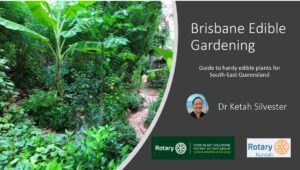
Growing Your Own Edible Perennials in Australia
– Dr Ketah Silvester, Brisbane Edible Gardening
Growing your own food is not always as easy as it looks on TV or in glossy magazines. For many years we gardened, diligently buying potting mix and planting European annuals like large tomatoes, cucumbers, broccoli, cabbage and lettuce. While we had some successes, lettuce often wilted, and large tomatoes were plagued with pests. The effort and expense involved kept us buying from the local grocery store. This all changed when we discovered edible perennial plants.
Together with Rotary and Food Plant Solutions we have now tested hundreds of species of edible plants in our experimental food forest in Mount Crosby, (Brisbane, QLD). The result is an edible foodscape full of the hardiest, most nutritious and delicious plants for Western Brisbane.
We want to share our experience to help everyone successfully grow, at least some, of their own food. For more information of edible perennial plants that will thrive in Brisbane feel free to follow us on Facebook, or visit our new website for plenty of tips and tricks for local and sustainable food growing.
We also run school and community education workshops and have a small community edible plant nursery in Mount Crosby. For more information or to get in touch please contact Ketah at brisbaneediblegardening@gmail.com
Editor’s Note:
We are in the first stages of creating a Tasmanian publication with Dr Silvester.
Publications for Vietnam
Thanks to a donation by the Rotary Club of Hobart, three picture guides have been created for our long-term partner in Vietnam – AOG World Relief, which will now be translated. Materials such as these can be created for every country. https://foodplantsolutions.org/programs/vietnam/

